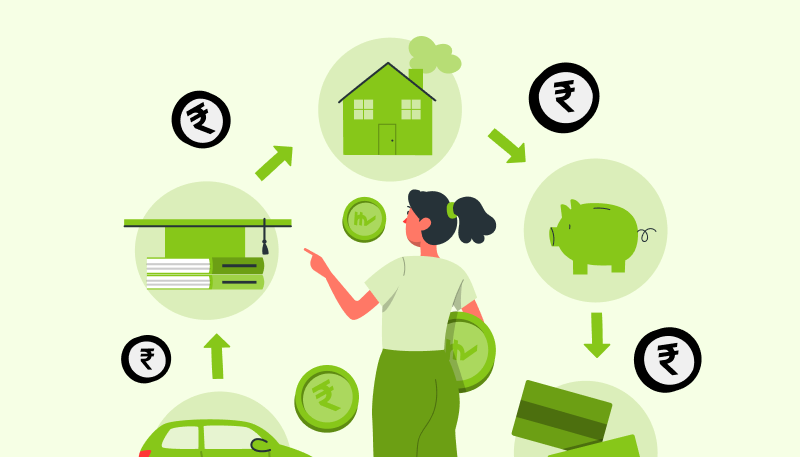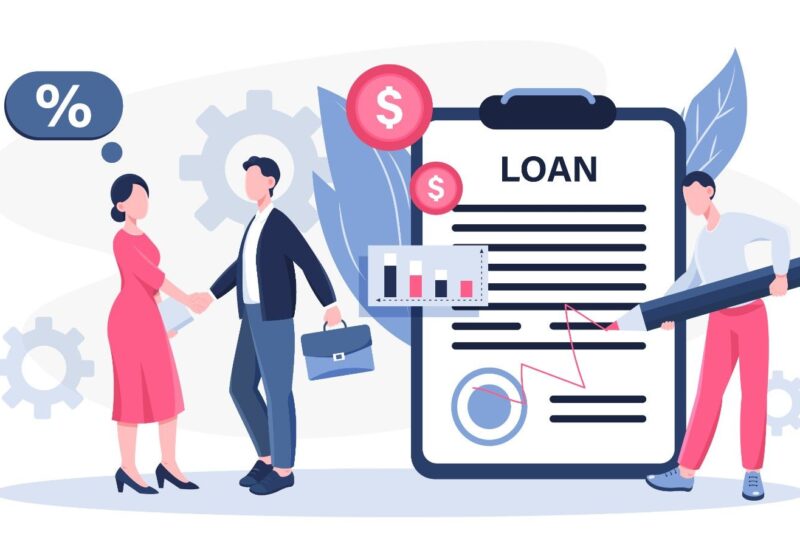Understanding which types of loans are best suited for your financial needs is essential for responsible borrowing. In India, individuals can access a wide variety of credit options based on their purpose, income, and creditworthiness. This blog will walk you through the secured and unsecured loans, their use cases, and when to choose one over another.
Secured vs. Unsecured Loans: Know the Difference
The most fundamental distinction when assessing which types of loans to take is whether the loan is secured or unsecured.
| Category | Secured Loans | Unsecured Loans |
| Collateral Required? | Yes (e.g., property, gold) | No |
| Examples | Home loan, gold loan, car loan | Personal loan, credit card, business loan |
| Interest Rate | Lower (due to security) | Higher (riskier for lenders) |
| Processing Time | Longer | Faster |
| Default Consequence | Loss of asset | Legal action, credit score impact |
Most traditional borrowers start by exploring secured and unsecured loans to match their immediate needs and financial stability.
Major Loan Types in India by Purpose

Let’s look at which types of loans are typically used at different life stages:
1. Education Loans
- Type: Secured or Unsecured
- Best for: Students seeking funds for higher studies
- Collateral: Required for amounts above ₹7.5 lakhs in most cases
- Repayment starts: After course completion + moratorium period
2. Home Loans
- Type: Secured
- Best for: Buying or constructing a house
- Collateral: The house itself
- Loan Tenure: Up to 30 years
3. Personal Loans
- Type: Unsecured
- Best for: Emergencies, weddings, travel
- Collateral: Not required
- Processing: Quick disbursal in 24–48 hours
- With rising wedding costs, a marriage loan ensures you can plan your dream celebration without financial stress.
- With rising wedding costs, a marriage loan ensures you can plan your dream celebration without financial stress.
4. Gold Loans
- Type: Secured
- Best for: Short-term liquidity using gold assets
- Collateral: Gold ornaments or coins
- Interest Rate: Competitive, quick approval
5. Vehicle Loans
- Type: Secured
- Best for: Purchasing new or used cars or two-wheelers
- Collateral: The vehicle itself
- LTV (Loan-to-Value): Up to 90% of vehicle cost
6. Business Loans
- Type: Secured or Unsecured
- Best for: Working capital, equipment, expansion
- Collateral: Sometimes required
- Popular variant: Unsecured business loan for startups or small businesses
Understanding the pros and cons of secured and unsecured loans will help you pick the right financial instrument during each life stage.
NBFCs and fintech platforms now offer digital personal loans with minimal documentation and instant approval.
When to Choose Which Loan?

Here’s a quick comparison to help you understand which types of loans are suitable based on your needs:
| Situation | Recommended Loan Type | Why |
| Paying for college | Education Loan | Low interest, long repayment period |
| Buying a house | Home Loan | Tax benefits, low interest |
| Emergency medical expense | Personal Loan (Unsecured) | No paperwork, quick disbursal |
| Expanding a business | Unsecured Business Loan | No collateral required |
| Buying a car | Vehicle Loan | Competitive rates, flexible tenure |
| Needing cash for the short term | Gold Loan | Instant liquidity with minimal paperwork |
How to Choose the Right Loan Type
When comparing which types of loans to take, ask yourself the following:
- Do I have collateral to pledge?
- How quickly do I need the money?
- What is the purpose of the loan?
- Can I afford EMIs for the tenure?
These questions will help you filter between secured and unsecured loans and choose one that aligns with your risk appetite and repayment capacity.
FAQs on Loan Types in India
1. What is the difference between secured and unsecured loans?
Secured loans require collateral (like a house or gold), while unsecured loans do not, but often have higher interest rates.
2. Which types of loans are most common in India?
Home loans, personal loans, gold loans, education loans, and vehicle loans are most widely used.
3. Can a self-employed person get an unsecured business loan?
Yes, many NBFCs and digital lenders offer unsecured business loans based on bank statements and GST filings.
4. Are all personal loans unsecured?
Yes, most personal loans in India are unsecured and offered based on income and credit score.
5. Can I convert a secured loan into an unsecured loan later?
No, the loan type is fixed based on the original terms and risk evaluation by the lender.
Conclusion
Understanding which types of loans suit your situation is essential to borrowing responsibly. Whether you’re looking at secured and unsecured loans or planning for a business loan without collateral, it’s important to match your financial goals with the right borrowing tool.




Good callout on education loans needing collateral above ₹7.5 lakhs. That’s a detail many students and parents overlook, and it can definitely affect planning for higher studies abroad.
This breakdown of secured vs. unsecured loans is really helpful, especially for people who may be taking their first loan and aren’t sure why interest rates differ so much. One thing worth adding is that borrowers should also consider their repayment stability—if income is uncertain, choosing a shorter tenure can sometimes prevent long-term strain. Overall, understanding the purpose of the loan before applying really does make the decision clearer.